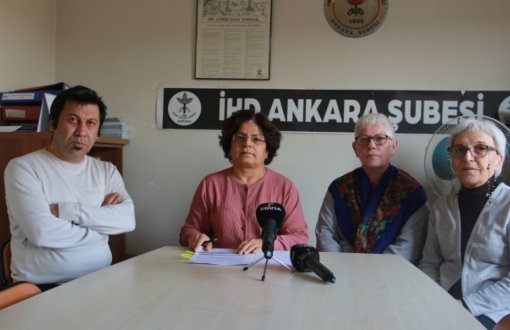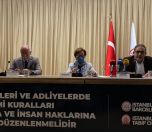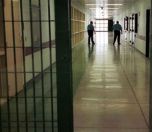* Photo: Mezopotamya Agency (MA)
Click to read the article in Turkish
The Human Rights Association (İHD) Ankara Branch Prisons Commission has released its third quarterly report on the violations of rights committed in central Anatolian prisons in July-August-September 2021.
The findings of the report were shared with the public at a press conference in the İHD Ankara Branch Office.
According to the findings read out by Nuray Çevirmen from the İHD Central Executive Board yesterday (October 28), nine people lost their lives in prisons in the region in this three-month period on a series of grounds such as the coronavirus, various diseases and alleged suicides.
Right to health
According to the applications to the İHD, prisoners faced the following problems in central Anatolian prisons in the third quarter of 2021:
* Transfers are made in unhealthy one-person vehicles, which especially affects the prisoners with cardiac diseases, asthma and epilepsy.
* Prisoners undergo medical examination in handcuffs; they are referred to hospitals while they are handcuffed.
* Ill prisoners are taken to sick rooms late; their referral to hospitals is either done late or not done at all. Moreover, there are also interruptions in the tests and checks that should be done on a regular basis
* Taking a political stance, the Forensic Medicine Institution does not give a report of "They cannot stay in prison"; the reports on inability to stay in prison issued by fully-fledged hospitaşs and university hospitals are not accepted and the execution of seriously ill patients is not deferred.
* Prisoners who are so sick that they cannot take care of themselves are put in jail without considering their condition.
* Prisoners with serious psychological disorders are not released.
* The dental treatment of prisoners is not done.
* A prisoner has gone on a hunger strike over the failure to refer her/him to a hospital for 8 months and due to other problems.
Torture is still in place
The report has also shared the findings about torture and ill treatment in the prisons of central Anatolia briefly as follows:
* In the prisons of central Anatolia, seven prisoners stated that they were battered and subjected to ill treatment.
* A prisoner was tortured in the Aksaray Type T Prison, s/he was not taken to a hospital, her/his complaints were not accepted and for this reason, s/he has gone on a hunger strike.
* In the Kayseri No 1. Type T Prison, one prisoner said that s/he was battered, subjected to foot whipping with a truncheon 3-4 times, his/her hands and feet were held by 7-8 officers, they took off his shoes and started hitting under her/his feet, s/he could not stand on her/his feet for a few days and s/he knew several people who were subjected to torture.
* In the Konya/Aksaray Type T Prison, one prisoner said that s/he was subjected to torture and insults by the law enforcement during detention.
* In the Konya/Seydişehir Prison, one prisoner said that because s/he was held in solitary confinement and not allowed to meet others, s/he and four other prisoners have gone on a hunger strike.
* In the Sincan No. 1 High Security Prison, one prisoner said that he was subjected to torture.
* In the Sincan No. 3 Type L Prison, two women prisoners indicated that they were subjected to violence.
* Strip search of prisoners is still in place in prisons.
The İHD report has also raised concerns that even though the conditions for supervised release are met, the release of prisoners is delayed on arbitrary grounds. The report has added that the decisions of monitoring boards are effective in those delays and several people are kept behind bars even though they should have been released. According to the report, four people were given a punishment and their release was prevented in the Sincan Women's Prison on the grounds that they sang songs in Kurdish and performed folk dances.
Bans on communication
The bans on communication and other types of pressure faced by prisoners in central Anatolia have been listed as follows:
* Social activities (sports, chat, courses) are completely halted in some places while they are restricted in others. In very rare cases, when prisoners are allowed to do sports, the ones in the same ward can do so.
* Non-contact visits are held twice a month.
* During the pandemic, the right to make a phone call has been reduced to calling a single number for 20 minutes.
* The requests of two prisoners who wanted to attend funerals were rejected.
* The officers who searched the wards were reportedly not wearing protective equipment (masks, gloves, etc.) at times.
* Prisoners are not given metal spoons; they are given unhealthy plastic spoons instead.
* It was reported that daily Evrensel was not given to prisoners and as the reason for this, the ban on public ads imposed by the Public Advertisement Institution (BİK) on newspapers was cited as the reason. (EMK/SD)








